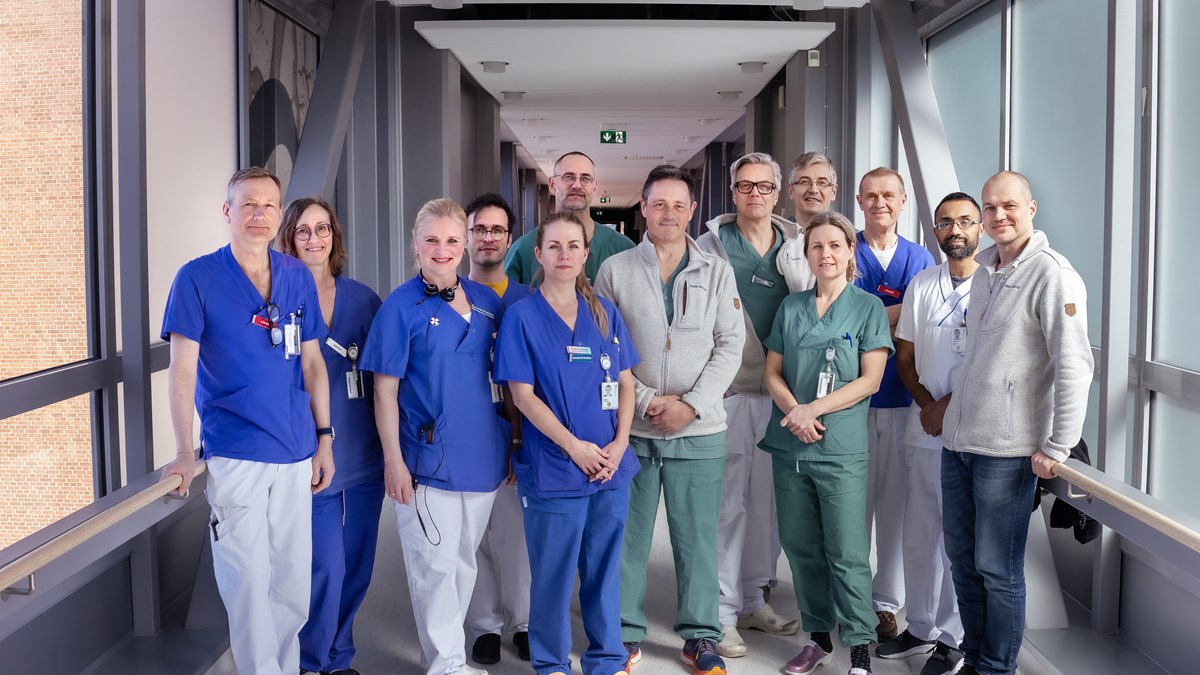25 years of successes in intestinal failure recognized at symposium

25 years ago, the Nordic region's first multivisceral transplant was performed at Sahlgrenska University Hospital, a very unusual procedure that can help patients with intestinal failure and other rare conditions in the gastrointestinal tract. Since then, care has taken great strides forward. This will be celebrated at a symposium in Gothenburg on May 22-23.
A multivisceral transplant involves transplanting several abdominal organs from a deceased donor at the same time. The organs that are transplanted are liver, stomach, pancreas, small and large intestine. Sahlgrenska University Hospital, which is a complete transplant hospital, was the first in the Nordics to perform the procedure in 1998.
Since then, around forty transplants have been carried out.
- Without transplantation, these patients would have died. This type of surgery requires very special skills and resources. The operation is extensive and can take many hours, says Gustaf Herlenius, Chief Physician and Team leader for multivisceral transplants at Sahlgrenska University Hospital.
The procedure and the aftermath require many professions to work side by side to take care of the patient. The operation can, among other things, help and save the lives of patients suffering from intestinal failure. A rare condition, and an area within which Sahlgrenska University Hospital offers care through the Intestinal Failure Center which has been operating since 2019. It is hoped that later this year the unit will receive the National Board of Health and Welfare's permission to conduct national highly specialized care in intestinal failure.
Highlights progress in intestinal failure at symposium
On May 22-23, the Transplantation Center and the Sahlgrenska Intestinal Failure and Transplant Center (SIFT) will jointly organize a symposium in Gothenburg. Partly to celebrate the 25th anniversary of the first multivisceral transplant, but also to draw attention to the great achievements made in the field of intestinal failure during that time period.
- Among other things, it concerns the formation of the Intestinal Failure Center, which is a successful model for caring for these patients. Instead of writing referrals to each other, skills from different clinics are brought together and allowed to work together in one place. During these 25 years, the outlook has improved a lot for patients with intestinal failure, says Jan Brun, Senior Physician and Head of the Sahlgrenska Intestinal Failure and Transplant Center at Sahlgrenska University Hospital.
This involves, for example, an adjustment and improvement of the nutritional solutions given to patients with intestinal failure, an increased knowledge of how inlets should be placed in the vessels to reduce the risk of clots and infection, and better knowledge of how the deep blood vessels should be kept open. There have also been drugs that improve the intestine's ability to absorb nutrients.
Progress has also been made in the surgical field, where new technology has led to safer operations.
There have been major changes. In addition to this, we have also become better at selecting the patients to be transplanted and we have a surgical team that has expanded over the years. Developments in anesthesiology have led to reduced risks for the patients we operate on, says Gustaf Herlenius.
Sahlgrenska University Hospital appointed international role
The symposium that targets all active professionals in the field of intestinal failure, will focus on both the surgical and medical aspects of intestinal failure in both children and adults. On the agenda are experts from Sweden, Argentina, Belgium, Finland and the USA. Together, they will provide a broad overview of the various treatment options available, as well as an insight into how the organization of intestinal failure care may look in different countries.
In connection with the meeting, the World Organization for Intestinal Failure and Intestinal Transplantation (IRTA) will appoint Sahlgrenska Intestinal Failure and Transplant Center to what is called a local chapter, i.e. national representative.
- This means that we will become the extended arm of the world organization in Scandinavia, and we are very proud of that. An honor that shows that we maintain a very good level at our center, says Jan Brun.
Program: "25yearsatsu.com"
Facts: Intestinal failure
Intestinal failure is defined as a condition where the absorptive capacity of the intestine is so low that extra energy-giving nutrients and/or fluid and electrolytes are required to maintain health. There are several causes of intestinal failure, including inflammatory bowel disease, vascular catastrophe, surgical complications or congenital malformations. These are relatively few patients, from newborns to adults, but these often have very long-term and tangible health and care needs with a major impact on quality of life. For some of the patients, the condition is life-threatening and the last resort is transplantation of abdominal organs, multivisceral transplantation. When it comes to transplants, Sahlgrenska University Hospital is one of the five largest centers in Northern Europe for this patient group.
This article was first published in Swedish in Sahlgrenskaliv, Sahlgrenska University Hospital's Digital Magazine.
If you are a hospital, authority or healthcare professional in another country interested in collaborating with the Sahlgrenska Intestinal Failure and Transplant Center, please reach out to us at Sahlgrenska International Care!